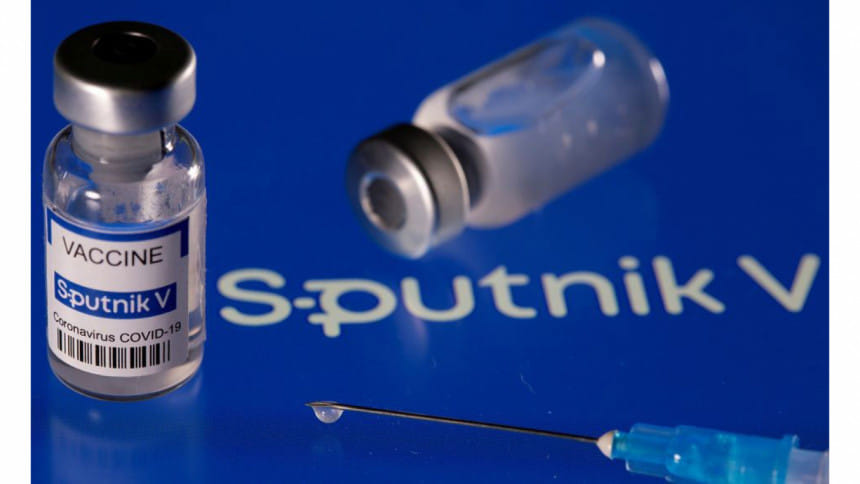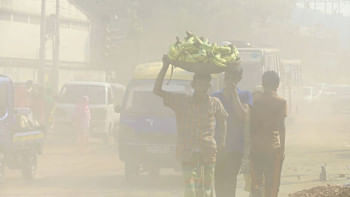Govt gives nod to Sputnik V for emergency use

In a desperate attempt to keep the mass vaccination campaign on track, the government yesterday gave emergency use authorisation to Russia's Sputnik V vaccine.
Bangladesh also sought an immediate supply of Covid-19 vaccine from China during the first meeting of the China-led initiative yesterday.
The country's vaccination campaign suffered a serious blow after the Indian government halted export of the Oxford-AstraZeneca vaccine produced by the Serum Institute of India. Bangladesh was running its inoculation campaign on the AstraZeneca vaccine.
Due to vaccine shortage, the government suspended administering the first doses from April 26.
However, the emergency authorisation of Sputnik V means there is no bar to importing and administering the vaccine in Bangladesh. Health officials said they can resume the first dose of vaccination once they get the Russian vaccine.
"The government will now bring the Russian Covid-19 vaccine to the country and it can be administered. Russia will give us 40 lakh doses in May and June," Maj Gen Mahbubur Rahman, director general of Directorate General of Drug Administration (DGDA), told The Daily Star.
He said Sputnik V will be administered as the first dose.
Sputnik is the second vaccine the DGDA approved after Covishield -- the AstraZeneca vaccine produced by Serum -- on January 4.
Asked about the price of the vaccine, the DG of the DGDA said the Russian and Bangladeshi governments will discuss and finalise the price.
Mahbubur said the vaccine, registered in around 60 countries, is currently in use in some of those countries and that its efficacy level is very good.
Sri Lanka, Pakistan and Myanmar have already approved Sputnik V. India has recently approved the use of Sputnik V as the country faces shortages of jabs amid an intensifying second wave of the deadly virus.
Russia approved the Sputnik V vaccine for domestic use in August last year. It claimed that its efficacy is around 91 percent, but the vaccine is yet to get approval from the World Health Organization.
Last week, Health Minister Zahid Maleque told The Daily Star that Russia has already offered to sell Bangladesh around 2.5 crore doses of Sputnik V by December this year in phases, or provide assistance in producing the shots locally.
The Russian government also offered to export a further 3.5 crore doses in phases by April next year.
Bangladesh has also sought vaccine from China and wants it as soon as possible
"They [China] said they would work with us," Foreign Minister AK Abdul Momen told reporters yesterday following a virtual foreign ministers' meeting involving China, Bangladesh, Sri Lanka, Nepal, Afghanistan, and Pakistan.
This is the first meeting of the China-led initiative called "China-South Asia Platform for Covid-19 Consultation, Cooperation, and Post-pandemic Economic Recovery".
Under the platform, China proposed establishing Covid-19 emergency medical facilities, poverty alleviation, and e-commerce in rural areas.
Earlier, Sinopharm -- a Chinese state-owned enterprise -- had committed to giving six lakh doses of vaccine to Bangladesh free of cost and the organisation also said they are capable of supplying around 15 lakh doses per week, said health officials.
Asked, DGDA DG Mahbubur said the emergency usage authorisation for Sinopharm vaccine will be given once they get the documents from the organisation.
With the Serum Institute of India failing to comply with the commitment to supply three crore vaccine shots in six instalments, the Bangladesh government started to explore alternative sources for the jabs and found Sputnik V and Sinopharm suitable.
But the concern about the second AstraZeneca dose for those who have already taken the first jab is yet to be resolved.
Around 35 lakh people are yet to get their second jab of the AstraZeneca vaccine, but the government only has around 20 lakh doses in hand.
Health officials said the vaccines in hand will run out within two weeks. If more AstraZeneca doses are not secured by then, the second-dose campaign will be hampered, they feared.
Md Sayedur Rahman, chairman of pharmacology department at BSMMU, told The Daily Star on Monday that Oxford researchers had demonstrated that a 12 weeks' gap between doses of AstraZeneca provides maximum protection.
"The UK government is continuing their vaccination programme with 12 weeks' interval [between doses]. Even Canada is giving [the second dose] after 16 weeks [of administering the first dose]. So, the Bangladesh government has eight additional weeks in hand to manage the vaccine," he said.

 For all latest news, follow The Daily Star's Google News channel.
For all latest news, follow The Daily Star's Google News channel. 



Comments